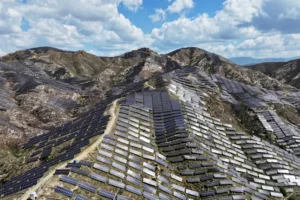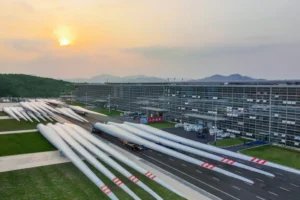By Ghulam Haider
Fossil fuels—oil, gas, and coal—account for an overwhelming 90% of global carbon emissions, cementing their role as the principal catalysts of climate change. The landmark decision at last year’s UN Climate Conference in Dubai to transition away from these energy sources represents a pivotal moment in the global effort to combat environmental degradation. This bold commitment underscores an urgent acknowledgment of the need to mitigate the destructive impact of fossil fuels on our planet.
However, this transition, while necessary, is fraught with challenges, particularly for economies deeply dependent on fossil fuels for energy and growth. For decades, these resources have powered industrial revolutions and underpinned economic progress, fueling prosperity in many parts of the world. Yet, this development has come at a steep cost—irreparable harm to ecosystems and a disproportionately adverse impact on vulnerable regions that have contributed least to global emissions.

The shift toward cleaner energy is more than a technical adjustment; it is a comprehensive reimagining of global energy systems. It requires significant investment, policy innovation, and international cooperation. While wealthy nations possess the resources to accelerate the adoption of renewables, developing economies face formidable obstacles, including limited financial capacity, high costs of clean energy technologies, and structural barriers.
The Dubai commitment must now translate into action, ensuring that the transition is equitable and inclusive. Developing nations, often the most affected by climate change, require robust support to achieve sustainable energy transitions without compromising their growth potential. Global partnerships, increased investment in renewable energy infrastructure, and technology transfer are essential to bridging the gap between ambition and execution.
Ultimately, transitioning from fossil fuels is not just an environmental necessity but a moral imperative. It offers the promise of a sustainable future, one where economic growth and environmental stewardship coexist harmoniously, safeguarding the planet for generations to come.
The Role of Fossil Fuels in Economic Development
Fossil fuels have long been the cornerstone of industrial and economic advancement, fueling the engines of the industrial revolution and driving the unprecedented growth and prosperity of developed nations. They provided the energy required to power factories, transport systems, and economies, accelerating progress at an extraordinary pace. However, this reliance on fossil fuels has exacted a profound and far-reaching toll on the planet.
The extraction and burning of fossil fuels release immense quantities of carbon dioxide and methane—potent greenhouse gases that are the primary drivers of global warming. Over time, this unchecked emission of pollutants has wreaked havoc on ecosystems, disrupting natural balances and intensifying the effects of climate change. The result has been a cascade of environmental challenges, from melting ice caps and rising sea levels to biodiversity loss and increasingly erratic weather patterns.
Tragically, the countries least responsible for historical greenhouse gas emissions often suffer the most severe consequences. Developing nations, with minimal contributions to global carbon footprints, are disproportionately vulnerable to the impacts of climate change. These regions face escalating risks of devastating floods, prolonged droughts, and extreme heatwaves that threaten lives, livelihoods, and infrastructure. The irony is stark: while wealthy nations reaped the benefits of fossil-fuel-driven industrialization, poorer countries are left grappling with its environmental fallout.

The legacy of fossil fuels thus presents a complex dilemma. While they have been instrumental in shaping modern economies, their detrimental effects on the planet and inequitable burden on vulnerable nations highlight an urgent need for change. Transitioning to cleaner energy sources is not merely an environmental necessity but also a moral obligation to redress the imbalance and foster a more equitable and sustainable future for all.
Divergent Approaches to Transition
For decades, the global community has acknowledged the urgent need to reduce dependence on fossil fuels. However, disagreements on how to transition equitably have hindered progress. Industrialized nations advocate for a swift shift to renewable energy sources, arguing that rapid action is essential to curb emissions and mitigate climate change. On the other hand, developing nations emphasize the need for a gradual transition to avoid compromising their economic growth and development.
The Glasgow Climate Conference in 2021 marked a step forward by calling for a “phase-down” of fossil fuels, though it fell short of offering a comprehensive roadmap. The decision at the Dubai conference to “transition away” from fossil fuels signifies a more pragmatic approach, acknowledging the complexities of moving beyond oil, gas, and coal. If executed equitably, this transition could significantly advance climate action, reduce pollution, and create jobs.
Challenges of a Renewable Energy Transition
Despite the growing consensus on the need to transition, the global energy mix remains dominated by fossil fuels, accounting for approximately 80% of energy production. The transition to renewable energy, while necessary, is expensive and fraught with challenges, particularly for developing nations. The lack of sufficient international and national public financing for clean energy exacerbates the difficulty of moving away from fossil fuels.
Structural challenges, policy obstacles, and fiscal constraints hinder the large-scale development of renewable energy infrastructure in regions like Asia and Africa. These regions, rich in solar, wind, and hydropower potential, remain underutilized, leaving millions without access to electricity. According to the International Energy Agency (IEA), around 670 million people, primarily in the least developed countries, still lack electricity.
While global investment in clean energy has increased by 40% since 2020, the distribution remains uneven. Developing and emerging economies, which are home to nearly half the world’s population, received only 16% of global renewable energy investments in 2023. Africa’s share over the past two decades has been an abysmal 2%, and nearly 40% of its population remains without electricity.

The Need for Equitable Investment
The IEA estimates that investments in renewable energy in developing economies need to increase by more than five times by 2030 to facilitate an orderly energy transition. Scaling up investment in all aspects of a clean energy system is crucial for achieving global climate goals. However, inequality in funding and support across regions threatens to delay this transition, disproportionately affecting the most vulnerable populations.
Several barriers inhibit renewable energy development in these economies, including high capital costs, limited fiscal capacity for government support, and challenging business environments. Meanwhile, industrialized nations continue to expand their renewable energy systems. In Europe, for instance, fossil fuel-based electricity generation has declined significantly as wind and other renewables gain prominence. In 2023, fossil fuel electricity generation in Europe dropped by 19%, a positive step toward reducing GHG emissions.
Building a Collaborative Framework for Transition
Achieving global climate goals requires stronger multilateral support and collaboration across all regions. A just, orderly, and equitable energy transition depends on creating a level playing field for developing and emerging economies. This means addressing financial and structural barriers and ensuring that investments in clean energy are accessible to all countries, not just the wealthiest.
International partnerships and collaborative efforts are essential to bridging the gap between developed and developing nations. Wealthier countries must honor their commitments to provide financial and technological support to less developed regions, enabling them to harness their renewable energy potential. Initiatives such as tripling global renewable energy capacity and phasing down unabated coal power are crucial steps in this direction, but their success hinges on inclusive implementation.
A Path Forward
The transition away from fossil fuels is not just a technological or economic challenge—it is a moral imperative. The world’s most vulnerable populations are already experiencing the devastating effects of climate change, despite contributing the least to global emissions. An equitable transition to renewable energy offers a pathway to not only mitigate climate change but also promote sustainable development and energy access for all.
To achieve this vision, the global community must prioritize inclusive and collaborative approaches. This includes scaling up investments in renewable energy infrastructure, addressing structural and policy barriers in developing economies, and fostering innovation to reduce the costs of clean energy technologies. By working together, nations can build a sustainable future that benefits both people and the planet.








 United Arab Emirates Dirham Exchange Rate
United Arab Emirates Dirham Exchange Rate

